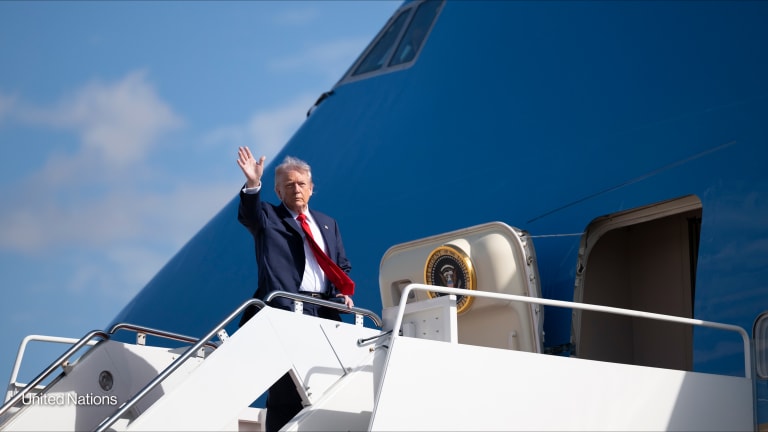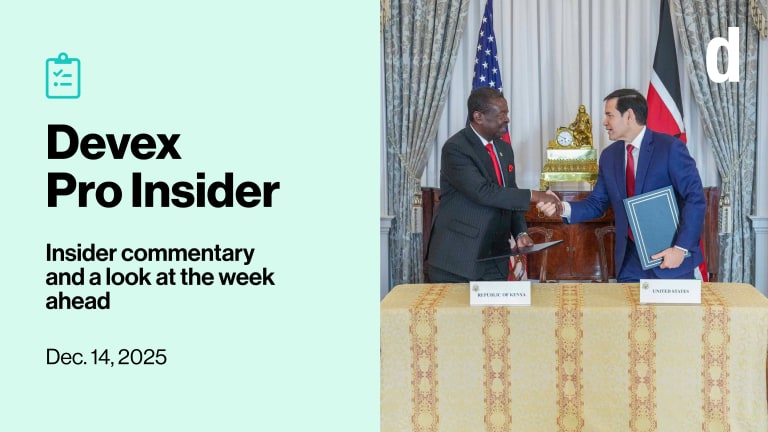Civil-military response to health emergencies: An appropriate last resort
After Ebola, the debate over civil-military cooperation during health emergencies is just beginning. At stake is the degree to which civilian health agencies will rely on military assistance in the future and the international community's collective ability to confront the next epidemic.
The Ebola outbreak in West Africa was officially declared in late March 2014. In the following months, civilian health agencies tried to contain the virus which had spread across borders from Guinea to Liberia and Sierra Leone. And by August, as the number of cases continued to rise, the outbreak was declared a public health emergency of international concern. Then in September, coinciding with a United Nations Security Council resolution on Ebola, United States President Barack Obama announced that 3,000 American military personnel would be deployed to the Ebola-affected region under Operation United Assistance. “Our forces are going to bring their expertise in command and control, in logistics, in engineering. And our Department of Defense is better at that, our Armed Services are better at that than any organization on Earth,” Obama said from the headquarters of the Centers for Disease Control and Prevention in Atlanta, Georgia. Obama’s decision to commit U.S. forces abroad faced little resistance and it is widely acknowledged that foreign military intervention played an instrumental role in curtailing the spread of the virus. But for the global health community, the debate over civil-military cooperation during health emergencies is just beginning. At stake is the degree to which civilian health agencies will rely on military assistance in the future and the international community’s collective ability to confront the next epidemic. The civil-military paradigm Any merging of military engagement and humanitarian or development aid is controversial. Opponents of civil-military arrangements argue the mere presence of military during any humanitarian situation runs counter to the core principles of humanitarian work and view it as an encroachment. Conventional military doctrine, meanwhile, has been slow to open up space for humanitarian actors, particularly in conflict situations but other global crises as well. Despite some interagency successes, the wars in Afghanistan and Iraq exacerbated the ideological and operational differences. In what was perhaps the most dramatic display of recent military-humanitarian tension, Médecins Sans Frontières, the organization on the front lines of the fight against Ebola, pulled out of Afghanistan in 2004 after accusing the U.S.-led coalition of co-opting humanitarian aid to support military and political goals. But the sharp increase in humanitarian crises around the world and effective civil-military responses are shifting perceptions and practices. Despite an internal culture and policies forbidding collaboration with the military, MSF was one of the leading voices calling for foreign military assistance in the response to Ebola. Whether successful or not, the civil-military outcomes in West Africa were going to shape the future of health emergency response. “There is an acceptance, to a certain extent, that the military have a role to play in these types of emergencies,” according to Adam Kamradt-Scott, a University of Sydney professor and global health security expert who authored a recent report on the civil-military response to Ebola titled “Saving Lives.” The Ebola crisis was unique because it was the first time foreign military forces were deployed exclusively to deal with an infectious disease outbreak. In addition to the 3,000 U.S. troops deployed to Liberia, the United Kingdom sent approximately 700 troops into Sierra Leone. China, Canada and Germany also deployed military health workers. With the world’s largest military and bilateral aid budget, the U.S. will continue to set an important tone for the future of civil-military relations during health emergencies. U.S. forces in Liberia focused primarily on constructing Ebola treatment units and training local health workers. They also delivered key capabilities, such as lift and logistics support, that did not exist otherwise. The use of military aircraft was viewed as particularly critical to the response. According to sources familiar with the dynamics in Liberia and Sierra Leone, the American and British pledges of military assistance also provided an instantaneous morale boost to NGO workers and the general population. “The deployment of military personnel in this context actually provided a huge confidence building mechanism that everyone benefitted from,” said Kamradt-Scott. “It fundamentally changed the situation on the ground.” Civil-military analysts highlight that America’s response to Ebola functioned properly due to clear and consistent communication throughout the entire mission, beginning with a clear request for support from the government of Liberia and announcement from Obama. The military mission was unequivocally in direct support of USAID which served as the primary link to the NGO community and other national and international partners. “Ebola was a good case in that the driving principle was not to replace or replicate that which civilian agencies can provide, but to do what the military can to enable and empower them to operate,” said Janine Davidson, senior fellow for defense policy and civil-military relations expert at the Council on Foreign Relations. A last resort In the wake of what was assessed as an insufficient civilian response to Ebola, the question becomes do civilian health agencies, such as the World Health Organization, try to build the critical logistical, engineering and airlift capabilities internally or instead double down on civil-military cooperation so they are better prepared for the next health emergency. According to Kamradt-Scott, civilian agencies are not going to establish the military capabilities exhibited during Ebola anytime soon. “WHO is not going to be given millions of dollars to buy helicopters,” he said. Recent multilateral and bilateral initiatives appear to recognize the importance of civil-military engagement in the future of health emergency response. For instance, a U.N. High-Level Panel on Global Response to Health Crises and ongoing reform efforts at the WHO, including the establishment of a Global Health Emergency workforce, are expected to account for military’s role in future health emergencies. In Washington, the U.S. Department of Defense has updated its Military Health System policies to reflect the importance of capacity building and alignment with other U.S. government agencies, partner nations, and nongovernmental organizations. The Defense Department has also established new offices, systems and positions, including a global health engagement coordinator, to enhance cooperation with civilian agencies. The U.S. Agency for International Development recently updated its civilian-military cooperation policy which lays out guiding and operational principles for how the development agency works with the U.S. Department of Defense. The U.S. civil-military analyst Davidson said the Pentagon’s global health emergency protocol will likely be integrated into existing concepts and doctrine for humanitarian assistance and disaster response which are considered core missions. “The Ebola response is being looked at and mined for new insights and lessons … from planning to logistics,” she said. But as political, military and development leaders evaluate the positive aspects of the Ebola experience, they must also appraise the risks and constraints associated with deepening civil-military engagement. Experts are quick to point out that foreign military assistance was requested as a last resort during the Ebola outbreak and it should remain that way moving forward. “Initially, the development community kind of regretted that the military had to be called in.” said Kamradt-Scott. “It is both appropriate as well as important that the public health, development, NGO communities try to deal with that crisis first and foremost on their own without military involvement.” Moreover, the context of the emergency — historical, social, political, and economic — must shape and set the boundaries for future military intervention. Decisions to extend military support should be made strictly on a case-by-case basis. The strong historical and military ties between the U.S. and Liberia as well as the U.K. and Sierra Leone, for instance, are widely considered to have helped streamline and maximize military assistance in the fight against Ebola. The next disease outbreak could very well happen in a less accommodating part of the world. “If we will look at the Ebola experience and say that’s it, that’s the model, [and then] if we deploy the military and think it will work smoothly during the next emergency, there are so many things that can conceivably go wrong,” said Kamradt-Scott. Lessons moving forward More global health cooperation among civilian and military actors will require new ways of thinking and training. Indeed, there are sizable gaps on both sides of the civil-military equation and closing them will require a better understanding of each side’s capabilities. “The military brings a professionalism, a known product and hardware during these situations, but they also need to come in with an open mind and understanding of how NGOs operate,” declared Jamie Jamieson, a former British Army logistics officer and director of support services at the Save the Children Sierra Leone country office. “At the same time, NGOs need to understand how the military operates … the rigidity of the military. There’s training that needs to happen on both sides,” said Jamieson, who admitted that the military is not accustomed to working with other parties outside the chain of command. He suggested that military continue to invest heavily in communication, gender and cultural awareness training which are crucial to effective NGO work at the community level. The “Savings Lives” report made several other strategic and tactical recommendations, including that the global health community conduct multilevel risk assessments before military is deployed and rigorous independent evaluation to avoid repeating errors and capture valuable lessons. Analysts anticipate that the U.S. military will also begin to more closely monitor and evaluate the results of its Medical Stability Operations and special health missions. “To this day, there is still a lot of confusion between these different groups. The militaries don’t understand the NGOs and the NGOs don’t understand the militaries. And some of that seems to be intentional,” revealed Kamradt-Scott. “The greatest challenge for global health leaders is to better understand what the military can do in these circumstances.” There is significant middle ground between adamant resistance to any military intervention in global health and indiscriminate reliance on military intervention. Many global health leaders eagerly await the day global health investments equal defense spending and militaries are not required in global health emergencies. But as long as infectious disease persists and until developing countries build robust health systems staffed by well-trained and equipped health workers, it is reasonable to expect that the military will be called on to help. The Ebola situation exposed many tough realities for the global health community, particularly the weaknesses in developing country health systems despite massive inflows of foreign aid and technical assistance and incapacity to deal with a massive disease outbreak. These shortfalls underscore the importance of defining future resources, systems, roles, responsibilities and boundaries for all parties. But during the Ebola fight, Save the Children’s Jamieson observed the tremendous potential when NGOs, governments and militaries cooperate to tackle a challenge and achieve a mission. “There was a common enemy. Whether you were wearing a white T-shirt or a khaki uniform, we were in this together.” Check out more insights and analysis for global development leaders like you, and sign up as an Executive Member to receive the information you need for your organization to thrive.
The Ebola outbreak in West Africa was officially declared in late March 2014. In the following months, civilian health agencies tried to contain the virus which had spread across borders from Guinea to Liberia and Sierra Leone. And by August, as the number of cases continued to rise, the outbreak was declared a public health emergency of international concern.
Then in September, coinciding with a United Nations Security Council resolution on Ebola, United States President Barack Obama announced that 3,000 American military personnel would be deployed to the Ebola-affected region under Operation United Assistance.
“Our forces are going to bring their expertise in command and control, in logistics, in engineering. And our Department of Defense is better at that, our Armed Services are better at that than any organization on Earth,” Obama said from the headquarters of the Centers for Disease Control and Prevention in Atlanta, Georgia.
This story is forDevex Promembers
Unlock this story now with a 15-day free trial of Devex Pro.
With a Devex Pro subscription you'll get access to deeper analysis and exclusive insights from our reporters and analysts.
Start my free trialRequest a group subscription Printing articles to share with others is a breach of our terms and conditions and copyright policy. Please use the sharing options on the left side of the article. Devex Pro members may share up to 10 articles per month using the Pro share tool ( ).
Former director of global advisory and analysis, Pete managed all Devex research and analysis operations worldwide and monitors key trends in the global development business. Prior to joining Devex, Pete was a political and security risk consultant with a focus on Southeast Asia. He has also advised the U.S. government on foreign policy and led projects for the Asian Development Bank and International Finance Corp. He still consults for Devex on a project basis.








